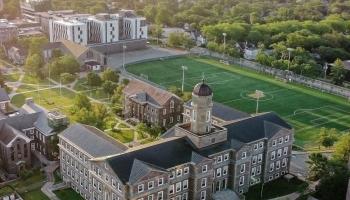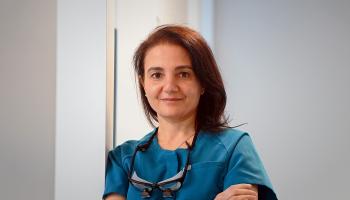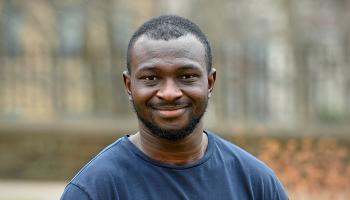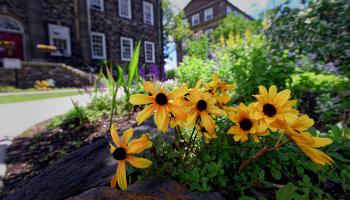Five million reasons to smile
The impact of the Dalhousie Fund can be felt across campus every day in myriad ways.
The Dalhousie Fund is fueled by the power of collective participation — it’s not about any one gift, but the potential of what can be achieved together. In this way, even smaller contributions can have a much larger impact on students' lives.
In 2020-21, alumni and friends donated more than $5 million through the Dalhousie Fund, which was directed to empower students to realize their ambitions and to thrive. With the sheer breadth of initiatives this support enables, it can be difficult to conceive of the true magnitude of its impact.
Through gifts to the Dalhousie Fund, donors can choose exactly where they want to direct their support — whether it’s to faculty-based priorities or initiatives, class giving projects, or to benefit students across the university.
Being there for students when it matters
As a result of the COVID-19 pandemic, students have had to navigate through challenging and volatile circumstances. Fortunately, donor support at critical junctures has helped to ensure that unexpected events don’t derail months or years of hard work.
Few examples could illustrate this point better than the Emergency Microbursaries fund, which makes urgent financial assistance available to students across the university at moments when it’s most needed. For Jazmine Dewtie, a sociology student in the Faculty of Arts and Social Sciences, a one-time microbursary provided the reprieve she needed to continue her degree during a time of financial strain. Access to flexible emergency funding has been life-changing for students like Dewtie.

Arts and Social Sciences student Jazmine Dewtie. (Danny Abriel photo)
Dalhousie Fund donors came through for students experiencing difficulties again on Giving Tuesday in November 2021, throwing their support behind the Food Security Project. The initiative was launched in the first year of the COVID-19 pandemic in partnership with the J & W Murphy Foundation, which pledged to match up to $20,000 in gifts from individuals in support of the Dalhousie Student Union (DSU) Food Bank.
Hundreds of students access this resource every month. With the Giving Tuesday support, the food bank is confident in its ability to meet demand as lingering economic instability and inflation continue to influence food and grocery costs.
In total, Dalhousie donors brought in more than $80,000 for the DSU Food Bank through projectDAL, the university’s crowdfunding platform. But overall impact was even more far-reaching: across the province, Nova Scotia universities and the Nova Scotia Community College collectively raised upwards of $200,000 for students experiencing food insecurity, in response to a challenge from Dalhousie and the J & W Murphy Foundation.
Causes as varied as our community
Throughout the university’s 13 faculties, the Dalhousie Fund channels targeted support for a set of causes and projects as varied as the faculties themselves. These range from scholarships and bursaries to programming and projects designed to meet specific needs that have been identified.
Remote learning has amplified the importance of experience-based learning for students. In the Faculty of Architecture and Planning, gifts to the Dalhousie Fund create opportunities that allow students to connect theory to practice, in the form of getting out in the field and developing firsthand knowledge of various levels of planning.
A longstanding architecture tradition is Free Lab, an undertaking that prompts students to flex their design-build skills while executing projects designed for public spaces. Student installations at Nocturne, Halifax’s annual after-hours art festival, also promote hands-on learning in much the same way.
Torie Payne, a second-year Master of Architecture student, says opportunities to connect and engage with the local community and explain her work to a wider audience have triggered important paradigm shifts. She’s grateful to donors for creating these experiences.

Architecture student Torie Payne. (Danny Abriel photo)
In the Faculty of Computer Science, the Dalhousie Fund supports community-based initiatives that serve future students through exposure to opportunities in computing. This programming is tailored to reach high school students and underrepresented groups. Olivia Handspiker attended one such event at Dalhousie, which opened her eyes to the discipline she would ultimately go on to pursue.
Every time a Dalhousie supporter makes a gift to the Dalhousie Fund, they are participating in the formation of tomorrow’s changemakers. Through their collective generosity, they become a part of something so much bigger.
Web Extra
Watch an exclusive video featuring additional students who have benefited from the Dalhousie Fund.
View videoMORE TO THE STORY
JAZMINE DEWTIE
When Jazmine Dewtie enrolled at Dalhousie, she says it wasn’t without hesitation. She had spent three years working as a continuing care assistant and was not fully convinced that student life would be a better fit.
But she quickly found her footing, making connections with other Black students, learning more about her African Nova Scotian heritage and exploring related disciplines through the Transition Year Program.
By the time she was a few years into her Bachelor of Arts program, Dewtie again says she found herself questioning whether she was cut out for university study, this time due to financial stress. Even working two jobs, she struggled to keep up with rent and bills. Then she received a Emergency Microbursary.
“This help gave me immediate relief at a moment when I really needed it,” she says. “Knowing that Dal’s community of friends and supporters believed in my success and wanted me to be here has been a huge encouragement.”
Reinforcement from the Dalhousie Fund, combined with other support, is what Dewtie says made it possible for her to stay on course and continue to explore different possibilities for her future. At present, her dream is to become a social worker.
“Money problems are a problematic factor for many students,” she says. “I am grateful for the opportunities that Dalhousie donors ensure students have access to.”
TORIE PAYNE
For Torie Payne, the idea of gaining real-world experience was a major motivating factor in choosing Dalhousie for her graduate studies. Now halfway through her degree, she says she’s wholly satisfied with her decision, and thankful to the donors who help create these formative experiences for Architecture students.
“The opportunity to participate in design-build projects, such as Free Lab and Nocturne, allows us to connect our work with the wider Halifax community — which is truly magical,” says Payne. “The experiences of hands-on project management and building technology, leadership skills, confidence and organization are a few of the many amazing things a Dalhousie Architecture education has provided me with.”
Through the Dalhousie Fund, Architecture students receive access to special opportunities to develop skills they will use later in their careers. There are intangible rewards to this kind of work, too. For Payne, projects that intersect with the wider community trigger important paradigm shifts.
“Presenting our work to a new audience makes us think differently about it and consider its meaning more deeply,” she says. “This is good practice for professional work in the future.”
OLIVIA HANDSPIKER
When Olivia Handspiker was first introduced to the world of computer science at a Women in Technology event at Dalhousie, she says she realized she could merge two passions — art and technology.
“I had some exposure to technology such as editing my high school yearbook and some coding during an astronomy class, but I did not know much about computer science,” she says. “But I discovered that you could use it to integrate music, which I have played since I was very young, with art, and technology.”
The Women in Technology event was part of a suite of outreach programming the Faculty of Computer Science is able to execute, thanks to help from Dalhousie Fund donors.

Computer Science student Olivia Handspiker. (Danny Abriel photo)
Once enrolled at Dalhousie, a Women in Technology Scholarship in hand, Olivia connected with other scholarship recipients and eventually became president of the Dalhousie Women in Technology Society.
She says the spirit of accessibility and community she found through the Women in Technology initiatives in her faculty is evident in her course of study — she’s specializing in user experience, a discipline focused on how people interact with technology and making those interactions more meaningful.
“I want to help ensure that technology is as inclusive as possible,” she says. “Each course I take confirms I made the right choice for my degree.”









